Related Research Articles

National Alliance was a national conservative political party in Italy. It was the successor of the Italian Social Movement (MSI), a neo-fascist party founded in 1946 by former followers of Benito Mussolini that had moderated its policies over its last decades and finally distanced itself from its former ideology, a move known as post-fascismo, during a convention in Fiuggi by dissolving into the new party in 1995.
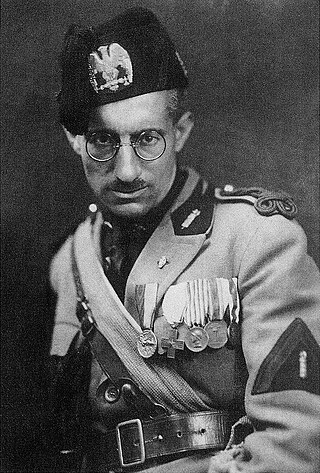
Michele Bianchi was an Italian revolutionary syndicalist leader who took a position in the Unione Italiana del Lavoro (UIL). He was among the founding members of the Fascist movement. He was widely seen as the dominant leader of the leftist, syndicalist wing of the National Fascist Party. He took an active role in the "interventionist left" where he "espoused an alliance between nationalism and syndicalism." He was one of the most influential politicians of the regime before his succumbing to tuberculosis in 1930. He was also one of the grand architects behind the "Great List" which secured the parliamentary majority in favor of the fascists.
FSN may refer to:
The National Front is an Italian far-right political party.
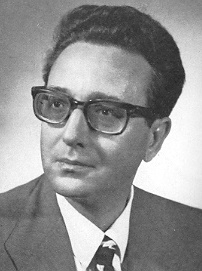
Giuseppe Umberto "Pino" Rauti was an Italian fascist and politician who was a leading figure on the radical right for many years. Involved in active politics since 1948, he was one of founders and, for many years, the leader of the Italian Social Movement (MSI). He was the main representative of the MSI's “moderates”.
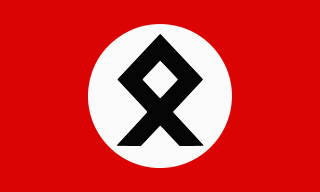
The National Vanguard is a name that has been used for at least two neo-fascist and neo-Nazi groups in Italy.
The National Front was a neo-fascist political party in Italy.
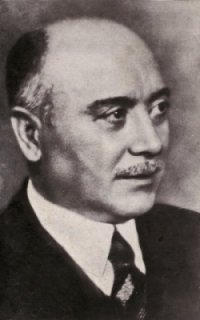
Orso Mario Corbino was an Italian physicist and politician. He is noted for his studies of the influence of external magnetic fields on the motion of electrons in metals and he discovered the Corbino effect. He served as the minister for education in 1921 and as the Minister for National Economy in 1921. He also served as professor of the University of Messina (1905) and of the University of Rome (1908).
Adriano Tilgher is an Italian far-right politician.

The Common Man's Front, also translated as Front of the Ordinary Man, was a short-lived right-wing populist, monarchist and anti-communist political party in Italy. It was formed shortly after the end of the Second World War and participated in the first post-war election for the constituent assembly in 1946. Its leader was the Roman writer Guglielmo Giannini, and its symbol was the banner of Giannini's newspaper L'Uomo qualunque.
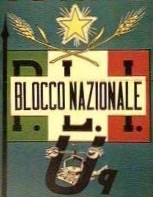
The National Bloc was a right-wing electoral alliance formed for the 1948 Italian general election by the Italian Liberal Party and the Common Man's Front.
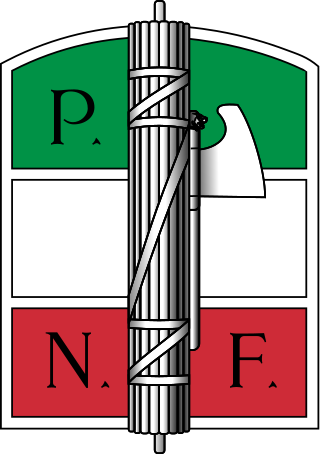
The National Fascist Party was a political party in Italy, created by Benito Mussolini as the political expression of Italian fascism and as a reorganisation of the previous Italian Fasces of Combat. The party ruled the Kingdom of Italy from 1922 when Fascists took power with the March on Rome until the fall of the Fascist regime in 1943, when Mussolini was deposed by the Grand Council of Fascism. It was succeeded, in the territories under the control of the Italian Social Republic, by the Republican Fascist Party, ultimately dissolved at the end of World War II.

Franco "Giorgio" Freda is one of the leading neo-Nazi and neo-Fascist intellectuals of the post-war Italian far-right. He founded a publishing house for neo-Nazi thought, and described himself as an admirer of Hitler. He was convicted but later acquitted for lack of evidence for involvement in the Piazza Fontana bombing. He founded the Fronte Nazionale, which was disbanded by the Italian government in 2000 when Freda and forty-eight other members were found guilty of attempting to re-establish the National Fascist Party.
National Union was a pro-fascist Italian Catholic political party during the 1920s, the first of several "Clerico-Fascist" political organizations established within the decade. The party was established with the permission of Pope Pius XI, dealing the final blow to the anti-fascist Catholic Italian People's Party.
Secolo d'Italia is a daily, conservative, online newspaper in Italy, published since 1952, formerly supporting neo-fascism. In 2012, it ceased its print edition and continued as an online-only publication.
This is a list of words, terms, concepts, and slogans in the Italian language and Latin language which were specifically used in Fascist Italian monarchy and Italian Social Republic.

The Italian Social Movement was a neo-fascist political party in Italy. A far-right party, it presented itself until the 1990s as the defender of Italian fascism's legacy, and later moved towards national conservatism. In 1972, the Italian Democratic Party of Monarchist Unity was merged into the MSI and the party's official name was changed to Italian Social Movement – National Right.
Post-fascism is a label that identifies political parties and movements that transition from a fascist political ideology to a more moderate and mainline form of conservatism, abandoning the totalitarian traits of fascism and taking part in constitutional politics.
The Green Front, whose complete name is Green Front – Independent Ecologists, is a small green political party in Italy, led by Vincenzo Galizia, a former leader of the "National Youth".

The Federation of Young Socialists is the youth wing of the Italian Socialist Party.
References
- 1 2 3 Italy December 1999 Archived 2012-07-13 at the Wayback Machine
- ↑ Antisemitism World Report 1994, Institute of Jewish Affairs, 1994, p. 51
- ↑ F.G.Freda , I lupi azzurri. Documenti del Fronte Nazionale , Edizioni di Ar, 2001